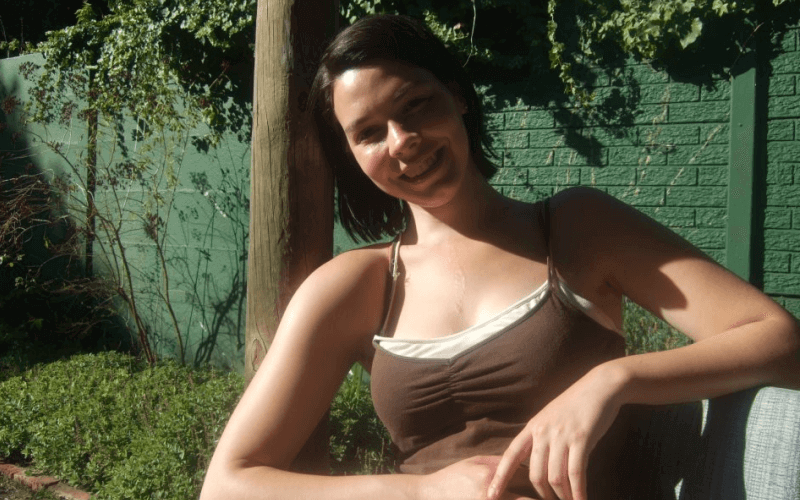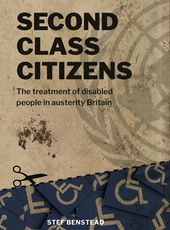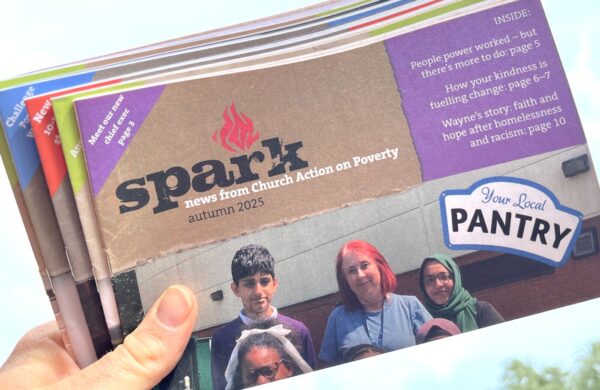Reflections on living in lockdown: shopping
Church Action on Poverty trustee Stef Benstead shares reflections on how the Coronavirus outbreak is affecting her life, as someone with disabilities who is used to being on a low income. In the first post of the series, she talks about shopping.

As someone with chronic illness, the lockdown imposed on society makes relatively little difference to me socially. My life was already a moderate version of what we now have.
Practically, the major impact for me is shopping. I used to buy online and arrange delivery for when my assistant would be in to put shopping away. Now I can’t do that. Because I use a mobility scooter, I was able to access one of the early morning supermarket slots recently, but I’m not usually up at that time. By the end of the shopping I was feeling really quite ill, and I still had to queue through the checkout, get home and put everything away. I went back to bed for several hours and still feel slightly ill three days later.
The shopping itself was a bizarre feeling: all the most important products had large empty spaces behind them on the shelves, and by the time I found the paracetamol and the soap there were no paracetamol-only tablets (I got some with caffeine, which I didn’t notice until I got home) and the only soap was handwash and three luxury bars. I’ve read that the issue isn’t stockpiling, but that people are buying more from supermarkets rather than cafes, restaurants etc; all the people doing as we’re told and going shopping less often are therefore buying more with each shop; and the just-in-time, money-saving approach of the capitalist supply chain simply can’t cope with a slight change in demand.
But the solution isn’t to turn to delivery services. 30% of individuals used online grocery shopping in 2019 but it made up less than 10% of grocery sales. Yet some 12 million people, or 20% of the country, are disabled, and right now everyone with limited mobility, high susceptibility, high risk of complications, current coronavirus symptoms or sole responsibility for young children needs 100% of their grocery shopping to be online. Care workers, both social care, social work and healthcare should also be getting deliveries to reduce their role in transmission, given their high exposure. Yet the only people to whom the government guarantees access are the 1.5 million extremely vulnerable. That’s well over 10 million people being utterly failed.
But getting delivery slots to disabled people isn’t enough. Healthy people need to eat and wash too! If disabled people need to go shopping at 8am to get paracetamol and soap, how are the healthy people who are also struggling to get delivery slots manage? We won’t control the spread of the virus if healthy people can’t wash, and there will be excessive suffering if the most basic drug, paracetamol, isn’t available. Our healthy population is about to discover why getting paracetamol on prescription, rather than only 32 tablets at a time, can make such a difference – because the last thing you want to do (and right now should do!) is to go out to the chemist to get more paracetamol when you have a raging temperature and debilitating pain.
The just-in-time supply chain doesn’t work. We urgently need much more rapid transport of food, hygiene and health products around the country for everyone. Not just the 1.5 million extremely vulnerable, not just the 12 million disabled, not just the over-70s, but everyone. Because everyone needs food and healthcare.
 Stef Benstead’s book Second Class Citizens: The treatment of disabled people in austerity Britain is available from the Centre for Welfare Reform.
Stef Benstead’s book Second Class Citizens: The treatment of disabled people in austerity Britain is available from the Centre for Welfare Reform.




Comments (01)
Comments are closed.